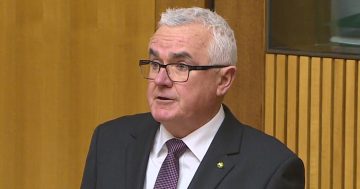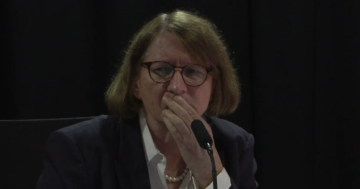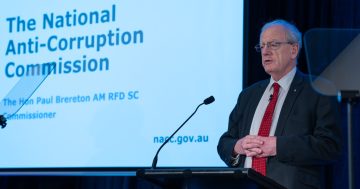
The Royal Commission into the automated debt recovery tactics of the Robodebt Scheme delivered its report two years ago. Photo: Michelle Kroll.
This week marks two years since Royal Commissioner Catherine Holmes delivered the report of her inquiry into the illegal scheme to the then Governor-General David Hurley.
Two years is a long time.
Plenty of time to implement all of the Royal Commission’s recommendations.
That hasn’t happened of course, but there have been some decent steps made towards ensuring such a disgraceful tragedy doesn’t happen again.
Without going all the way, however, the guarantee can’t be made of some type of new-look Robodebt never again being forced on an unsuspecting public and Australia’s most vulnerable.
News this week is also of Services Australia being cut adrift from the Department of Social Security to be folded into the Department of Finance’s domain.
Hopefully, a big part of the reasoning behind that move is that by bringing welfare service policy development and frontline delivery under Finance, a repeat of Robodebt might be easier avoided.
Artificial intelligence has been big news over the past few days too, with the PM suggesting it’s the future for jobs and China offering to include AI in an expansion of the free trade agreement it has with Australia.
Have we learned enough about the pitfalls and consequences of automation yet to fully embrace AI in government debt recovery?
All of this adds up to the need to impose far greater protections against another Robodebt emerging – for whatever the future looks like.
Holding accountable those responsible for their eagerness to inflict such misery on others might be a good start too.
The Australian Council of Social Service (ACOSS) marked Monday 7 July, the actual two-year anniversary of the Royal Commission report, by calling for all of the recommendations to be implemented.
Insisting that “alarming flaws in the social security system remain”, ACOSS wants to see more action from the Federal Government.
“Robodebt was a shocking abuse of government power that caused severe distress to more than 400,000 innocent people,” ACOSS’s Charmaine Crowe said.
“Many of the victims suffered financial hardship, relationship breakdowns, mental health difficulties and some were driven to self-harm.
“While the government has made some positive steps to improve social security administration in light of the Royal Commission, including implementing an advocates channel and strengthening the Ombudsman’s powers, there remains a lot more work to do.
“It is particularly concerning that no individuals involved have been properly held to account for the enormous injustice inflicted on hundreds of thousands of innocent people.”
What Ms Crowe and ACOSS are calling on the Federal Government to do is adopt the remaining recommendations of the Robodebt Royal Commission.
It would particularly like to see the following:
- Legislating a statute of limitations on debt recovery (“a key recommendation that remains unaddressed”)
- Refraining from recovering debts under review (“the default position is to continue recovery even when a debt is under review, rather than pausing automatically. A person can request a pause to debt recovery if it is under review”)
- Clarifying protections for people in vulnerable circumstances (“it’s still unclear how people in severe hardship are systematically shielded from compliance actions that could worsen their situation”) and
- Introducing a duty of care (“the government still has no formal obligation to ensure people are receiving the correct payment for their personal circumstances).
“These reforms are vital to improving our social security system and ensuring that nothing like Robodebt can ever happen again,” Ms Crowe said.
“We urge the government to take swift action to address these ongoing problems, particularly in light of other failures to properly administer the system, like the Targeted Compliance Framework, where people have had their payments wrongly cancelled.”
As we know, Robodebt was a scheme implemented between 2015 and 2020, which illegally calculated social security debts by averaging annual income earned by people receiving income support over fortnights, resulting in inaccurate debts.
As we also now know – and what ACOSS is keen to emphasise – hundreds of thousands of lives were awfully changed (“plunged into a state of crisis”) after receiving a notice claiming they owed the government money from years ago.
Some of those false debts ran into the tens of thousands of dollars, with recipients told they had to prove their innocence or pay up.
There were reports, both in the media at the time and as evidence before the Royal Commission, of suicide because of those debts.
Much of this column today has been committed to sharing ACOSS’s call – because it’s right.
Australia doesn’t need or want another Robodebt.
Implementing everything required to ensure there isn’t a repeat has to be the government’s highest priority.
Original Article published by Chris Johnson on Region Canberra.










